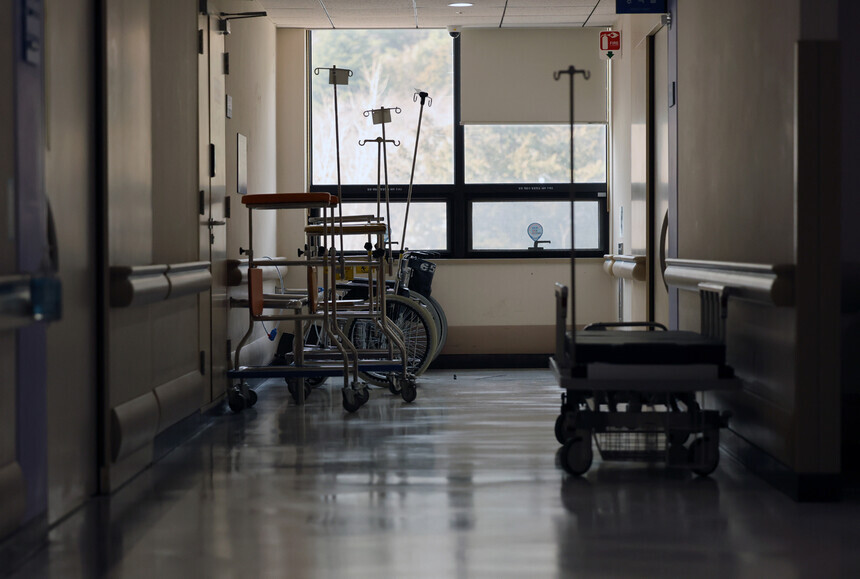hankyoreh
Links to other country sites 다른 나라 사이트 링크
Korean government tries both carrots and sticks to get doctors back to work

The South Korean government is hurrying to meet the demands of medical professionals by enacting a special law on medical malpractice procedures, while also moving to submit criminal complaints against officials in physician groups.
This mixture of “carrot” and “stick” measures comes ahead of the government’s stated deadline of Thursday for interns and residents to return to work.
During a central and local government cooperative meeting on Tuesday, South Korean President Yoon Suk-yeol said, “The 2,000-student increase in the medical college admission cap is an essential minimum measure to fulfill the state’s constitutional responsibilities.”
“It is not a matter for negotiation or compromise,” he stressed.
While reiterating its current approach, the administration has called on interns and residents to return to their jobs.
“As of March, the implementation of judicial procedures in terms of suspending licensing for those [interns and residents] who have not returned to work will be unavoidable,” Minister of Health and Welfare Cho Kyoo-hong said on Tuesday.
“We once again ask that they return by Feb. 29,” he added.
The same day, the Ministry of Health and Welfare submitted complaints to the police against officials in the Korean Medical Association. They were accused of inciting and abetting the interns’ and residents’ collective action, which constitutes a violation of the administrations’ order for them to return to work — in contravention of the Medical Service Act — and obstruction of operations according to the criminal code.
Roughly 4,700 individuals who have abandoned their hospitals and contracts after qualifying for resident programs were also ordered to continue practicing. The targets are those who finished their internship and were preparing to sign working contracts with hospitals after acceptance into resident programs. As with the previous back-to-work order, those who refuse could face the suspension of their medical license for up to one year.
As of 7 pm on Monday, a total of 9,909 interns and residents had submitted resignations at 99 teaching hospitals, with 8,939 of them having walked away from their treatment duties.
Park Min-soo, the second vice health minister, said there were “quite a few people returning to work at some hospitals.”
But an official at one university hospital told the Hankyoreh they had “not heard anything about them coming back” and that the “remaining medical staff members are struggling with excessive workloads.”
This suggests there have been no major changes in the interns’ and residents’ collective action despite the administration’s repeated warnings.
The health minister also warned that “special criminal punishment provisions will be applied through the enactment of a special law for medical workers who have enrolled in liability and general insurance and deductions.”
Observers read this as an attempt to build a justification for the interns and residents to return to work by agreeing to some of the physician groups’ demands.
Meanwhile, patient groups argued that the priority should be on remedying a system that currently makes victims and surviving family members responsible for proving medical malpractice.
The health care vacuum has continued to grow. Tertiary general hospitals, which are capable of performing advanced medical procedures such as cancer treatment and transplant operations, have seen their new admissions drop by 24% and surgeries by around 50% (based on a sample of 15 hospitals) since the collective action began.
The Health Ministry stressed that this was “entirely due to declines in the numbers of patients with moderate to minor symptoms.”
By Lim Jae-hee, staff reporter; Cheon Ho-sung, staff reporter
Please direct questions or comments to [english@hani.co.kr]

Editorial・opinion
![[Editorial] Intensifying US-China rivalry means Seoul must address uncertainty with Beijing sooner than later [Editorial] Intensifying US-China rivalry means Seoul must address uncertainty with Beijing sooner than later](https://flexible.img.hani.co.kr/flexible/normal/500/300/imgdb/original/2024/0517/8117159322045222.jpg) [Editorial] Intensifying US-China rivalry means Seoul must address uncertainty with Beijing sooner than later
[Editorial] Intensifying US-China rivalry means Seoul must address uncertainty with Beijing sooner than later![[Column] When ‘fairness’ means hate and violence [Column] When ‘fairness’ means hate and violence](https://flexible.img.hani.co.kr/flexible/normal/500/300/imgdb/original/2024/0516/7417158465908824.jpg) [Column] When ‘fairness’ means hate and violence
[Column] When ‘fairness’ means hate and violence- [Editorial] Yoon must stop abusing authority to shield himself from investigation
- [Column] US troop withdrawal from Korea could be the Acheson Line all over
- [Column] How to win back readers who’ve turned to YouTube for news
- [Column] Welcome to the president’s pity party
- [Editorial] Korea must respond firmly to Japan’s attempt to usurp Line
- [Editorial] Transfers of prosecutors investigating Korea’s first lady send chilling message
- [Column] Will Seoul’s ties with Moscow really recover on their own?
- [Column] Samsung’s ‘lost decade’ and Lee Jae-yong’s mismatched chopsticks
Most viewed articles
- 1For new generation of Chinese artists, discontent is disobedience
- 2[Editorial] Transfers of prosecutors investigating Korea’s first lady send chilling message
- 3[Exclusive] Unearthed memo suggests Gwangju Uprising missing may have been cremated
- 4[Editorial] Intensifying US-China rivalry means Seoul must address uncertainty with Beijing sooner t
- 5S. Korea “monitoring developments” after report of secret Chinese police station in Seoul
- 6N. Korean media upgrades epithet for leader’s daughter from “beloved” to “respected”
- 7Yoon says concern about biased diplomacy is being incited by “communist totalitarian forces”
- 8[Column] US troop withdrawal from Korea could be the Acheson Line all over
- 9Xi, Putin ‘oppose acts of military intimidation’ against N. Korea by US in joint statement
- 1060% of young Koreans see no need to have kids after marriage